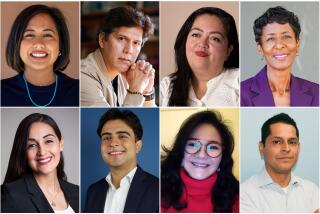What makes a good L.A. mayor
- Share via
Being a good politician is essential for winning a mayoral election. But the qualities that make a good politician are not necessarily those that make a good mayor.
That’s a paradox we all need to grapple with in deciding whom to support in next week’s mayoral election.
The stereotypical American politician is a seeker of adulation, someone who likes to be liked or needs the approval of others. But the reality of the mayor’s job frequently involves tough choices that result in unpopular decisions.
ENDORSEMENTS: Los Angeles City Elections 2013
Moreover, the campaign process sheds little light on a mayoral candidate’s ability to do the job. Electronic and print ads — the main reason candidates spend so much of their time trying to raise millions of dollars — can’t be trusted. A seemingly endless gantlet of forums and debates around the city give candidates a chance to repeat their favorite lines without having to answer challenging follow-up questions. And even if candidates are brave or ambitious enough to have outlined bold visions for the city, there is little way to gauge whether they’d be effective in implementing their ideas.
Being mayor of Los Angeles is not like being a council member or city controller. The job is markedly different than the previous jobs of all of the candidates. In the city’s political system, the mayor, not the council or the controller, has the responsibility to take the lead on proposing the annual city budget, addressing citywide issues such as the future of LAX or the port, and launching new citywide initiatives. The mayor’s accountability to the voters does not diminish the reality that, more than anybody else in City Hall, it’s the mayor who runs the show.
One of the main sources of an L.A. mayor’s power is the authority to handpick a team to implement a vision or a set of policies. With a large personal staff and an army of private citizens appointed to serve part time on city commissions, the mayor can dominate public discourse in City Hall, using staff resources to launch new ideas and the appointed commissioners to influence the direction of city departments. It’s very hard to gauge how any of the candidates would do with those tasks.
JIM NEWTON: The L.A. mayor’s race
None of the mayoral candidates has a track record as a chief executive recruiting, hiring and managing such a large cadre of field captains and foot soldiers. It would be helpful to know before voting how a candidate would reach beyond the throng of donors, campaign volunteers, personal friends (and friends of friends) to find the best individuals to work in city government, especially for key choices such as the chief of staff and the deputy mayors.
Though the City Charter does not give an L.A. mayor the centralized power used by other big-city mayors, the L.A. mayor indisputably can make loud and resonant use of the bully pulpit, defining an issue or setting the agenda for the city and even the broader Southern California region. But do we know how the candidates would use that platform?
Do any of the candidates have a big idea that could inspire the city? Bringing a World’s Fair to L.A.? Creating a citywide network of urban farms? Engaging the city’s vast creative community to reshape the urban landscape and solve city problems? Launching a community service corps energized by mandatory participation of the city’s teenagers? The mayor leading daily two-mile exercise hikes through urban or pastoral landscapes in the city? The mayor commuting daily to City Hall on public transit?
VIDEO: Interviews with L.A.’s mayoral candidates
This problem isn’t unique to Los Angeles. Voters everywhere have to make educated guesses about the ability of a candidate to do the mayor’s job. And each big-city mayor effectively reinvents the job when he or she is elected.
I hope that the candidates have studied the successes and failures of mayors in other cities, and, if they have, I wish they would talk about the lessons they’ve learned. How, for example, did New York’s Michael Bloomberg identify and attract the best and the brightest to work in his administration? How did Chicago’s Richard M. Daley get a city council majority and the bureaucracy to follow his lead? Was Washington’s Adrian Fenty smart about risking his political future to shake up the public schools? How did Riverside’s Ron Loveridge use his seat on the regional air board and his presidency of the National League of Cities to make a difference for his local constituents?
The lessons of our own city would also be worth studying. Most of the current candidates probably would agree that Mayor Antonio Villaraigosa’s embrace of Metro Rail expansion was good for the city. Some of his other choices have been more debatable. Villaraigosa’s first-term crusade to assert control over the L.A. Unified School District required the spending of precious political capital that could have been used to achieve other goals. He emulated Mayor Richard Riordan in bringing in business executives to oversee the city’s major economic development decisions despite their limited knowledge of city issues and the political process. If the current candidates were to reflect publicly on Villaraigosa’s two terms, voters would have a clearer idea of whether the candidates represent continuity or change.
The last days before the election are likely to bring a rising crescendo of candidates making personal attacks on one another. That’s what happened when I ran for mayor 20 years ago. I, for one, would prefer to hear the candidates inspire me with their leadership instead of tearing each other down.
Michael Woo, dean of the College of Environmental Design at Cal Poly Pomona, was one of two finalists in the 1993 campaign for mayor of Los Angeles.
More to Read
A cure for the common opinion
Get thought-provoking perspectives with our weekly newsletter.
You may occasionally receive promotional content from the Los Angeles Times.









